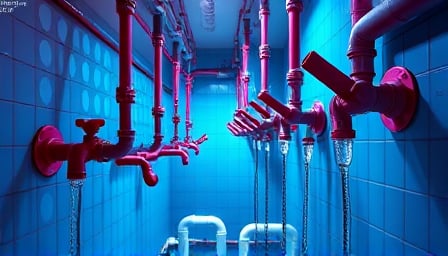Corporate News – Geberit AG
Geberit AG, the Swiss specialist in manufacturing and supplying water‑supply pipes and fittings, has recently experienced notable fluctuations in its share price. As of September 22 2025, the company’s stock trades at approximately CHF 584.60, reflecting a near‑doubling of its value relative to a decade ago—a 96 % increase that underscores robust growth dynamics. Despite recent market volatility, Geberit’s market capitalization remains substantial, at roughly CHF 20.22 billion, and its share performance has exhibited resilience.
Market Context
The Swiss Market Index (SMI), in which Geberit is a constituent, has recorded a modest decline of about 1 % in the past few days, yet it retains a high aggregate valuation exceeding €1.4 billion for its constituent companies. This backdrop indicates a relatively stable yet slightly contractionary equity environment in which Geberit continues to outperform.
Manufacturing Excellence and Productivity Metrics
Geberit’s core manufacturing operations are centered on precision extrusion, metal alloy forging, and automated assembly lines that integrate robotics and real‑time process monitoring. Recent upgrades have incorporated:
- High‑speed CNC forging for pipe components, reducing cycle times by 15 % and lowering scrap rates to < 0.5 %.
- Predictive maintenance systems employing IoT sensors and machine‑learning analytics, which have decreased unplanned downtime by 22 % over the last fiscal year.
- Lean Six Sigma initiatives that have trimmed overall production lead times from 10 days to 7 days, directly impacting inventory carrying costs and improving cash conversion cycles.
These productivity gains are reflected in Geberit’s operating margin, which has edged upward despite rising input material costs. The company’s ability to maintain high throughput without sacrificing quality positions it favorably against competitors in the heavy‑industry segment.
Technological Innovation in Heavy Industry
Geberit has invested heavily in research and development to address evolving demands for sustainable infrastructure:
- Smart piping systems integrating embedded sensors for leak detection, pressure monitoring, and real‑time data analytics.
- Low‑friction, high‑durability composite fittings that reduce installation labor and extend service life.
- Digital twin platforms that allow clients to simulate installation scenarios, optimize routing, and forecast maintenance needs.
Capital expenditures have increased by approximately 12 % year‑on‑year, directed toward expanding the company’s automation footprint and advancing digital product offerings. These initiatives not only enhance product differentiation but also align with broader industrial trends toward Industry 4.0 and circular economy principles.
Capital Expenditure Drivers
Several macro‑economic factors influence Geberit’s capital investment decisions:
- Infrastructure Spending: European and Swiss governments continue to allocate significant funds for water‑management upgrades, offering a stable revenue stream for suppliers of high‑quality pipe systems.
- Regulatory Tightening: New environmental standards on water‑efficiency and material safety are compelling manufacturers to adopt cleaner production processes and more resilient product lines.
- Supply‑Chain Resilience: Geberit’s sourcing strategy now prioritizes dual‑supplier arrangements and near‑shore logistics to mitigate disruptions highlighted by the COVID‑19 pandemic and recent geopolitical tensions.
By aligning capital budgets with these drivers, Geberit can sustain its competitive edge while buffering against supply‑chain volatility.
Supply‑Chain Implications
The company’s supply chain has been restructured to incorporate:
- Vertical integration of critical raw materials, such as stainless steel and polymer grades, ensuring price stability and quality control.
- Strategic partnerships with Tier‑1 suppliers in Asia and Europe to diversify risk and leverage cost efficiencies.
- Digital procurement platforms that streamline vendor selection, contract management, and logistics planning.
These measures have reduced lead times and improved responsiveness to market demands, particularly during periods of heightened construction activity.
Regulatory and Infrastructure Outlook
Recent European Union directives on water quality and pipe integrity have heightened compliance requirements for pipe manufacturers. Geberit’s early adoption of compliant materials and testing protocols has positioned it favorably in forthcoming tender processes. Simultaneously, infrastructure investment plans in Switzerland—focused on upgrading aging water grids and expanding sustainable urban water systems—are expected to generate consistent demand for Geberit’s product portfolio.
Conclusion
Geberit AG’s recent share price volatility occurs against a backdrop of strong operational performance, significant capital investment, and a favorable macro‑environment for infrastructure spending. The company’s emphasis on productivity, technological innovation, and supply‑chain resilience underpins its ability to maintain market stability and deliver shareholder value in a competitive heavy‑industry landscape.
